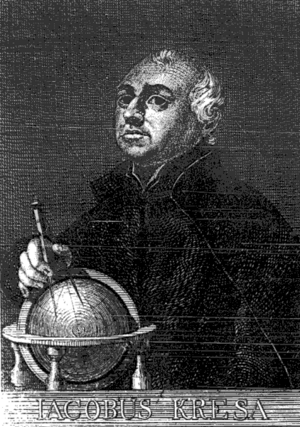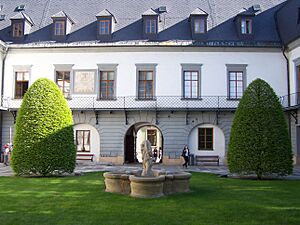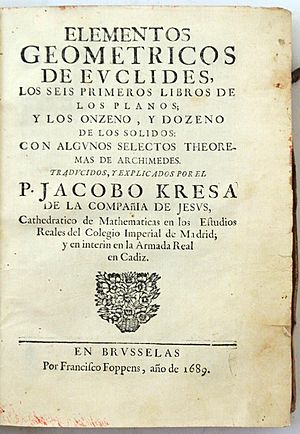Jakub Kresa facts for kids
Quick facts for kids
Jakub Kresa
|
|
|---|---|

Kresa c. 1700
|
|
| Born | 19 July 1648 Smržice, Margraviate of Moravia
|
| Died | 28 July 1715 (aged 67) Brno, Margraviate of Moravia
|
| Nationality | Czech |
| Alma mater | University of Olomouc Charles University |
| Known for | Introducing algebraic number to trigonometry Translating Euclid's Elements to spanish, thence the nickname "Euclid of the West" |
| Scientific career | |
| Fields | Mathematics, diplomacy |
| Institutions | University of Olomouc Colegio Imperial de Madrid Charles University |
| Doctoral students | Karel Slavíček |
Jakub Kresa (born July 19, 1648 – died July 28, 1715) was a very important Czech mathematician. He lived during the Baroque period. He was known for his amazing skills in math and languages.
Contents
The Life of Jakub Kresa
Early Years and Education
Jakub Kresa was born in a small village called Smržice. His family were small farmers. He went to a Jesuit school in Brno, where he was an amazing student.
He was not only good at math, but he also learned many languages. He could speak Hebrew, German, Latin, Italian, Spanish, French, and Portuguese. Of course, he also spoke his native Czech.
From 1670 to 1673, Kresa studied at Charles University in Prague. He continued his studies in math and theology. In 1680, he became a priest.
Teaching in the Czech Lands
In 1681, Jakub Kresa started teaching Hebrew at the University of Olomouc. He earned his first doctorate there. From 1682 to 1684, he taught mathematics.
While in Olomouc, Kresa helped a mathematician named Jan Taletius. Taletius created a way to predict eclipses of the sun and moon. Kresa was also asked to help with important tasks for the government. For example, he helped settle a disagreement during a farmers' uprising in 1680.
In 1684, Kresa moved back to Prague. He became the head of the Math and Hebrew departments at Charles University. He also preached at a church in Prague. By this time, he was famous for his skills in math, languages, and diplomacy. He was then offered a job in Spain.
Time in Spain
Kresa moved to Spain in 1686 and stayed there for 15 years. He worked as the head of the Math Department at the Colegio Imperial de Madrid.
To help Spanish students learn math, Kresa translated the first eight books of Euclid's Elements into Spanish. This made him very famous in Spain. People even called him the "Euclid of the West." It became common for Kresa to check math books before they were published. He also taught at the Naval academy in Cadiz.
Return to the Czech Lands
After the Spanish king Charles II died in 1700, Kresa returned to Prague. He earned another doctorate, this time in theology, from Charles University. He also started teaching theology there.
At the same time, he taught math privately. He worked on many math topics, including arithmetic, fractions, logarithms, trigonometry, astronomy, and algebra. One of his students, Count Ferdinand Herbert, shared Kresa's ideas in a magazine in 1711.
Later Life
The Emperor Leopold I chose Kresa to be a special advisor to his son, Archduke Charles. Kresa stayed in this role even when Charles became the King of Spain. So, Kresa went back to Spain with him from 1704 to 1713.
After nine more years in Spain, Kresa returned to the Czech Crown lands. He worked on math theories with his student Karel Slavíček in Brno. Jakub Kresa died there in 1715.
Kresa's Legacy
Kresa's students, František Tillisch and Karel Slavíček, wrote down his notes for printing. Both of them later taught at Olomouc.
A student named Kryštof John recorded Kresa's lectures from Charles University. These notes were published as Mathematica in universitate Pragensi tradica a P. Jacobo Kreysa ... excerpta anno 1685. You can find this old book at the library of Strahov Monastery today.
In Kresa's time, Trigonometric functions were usually understood using shapes and geometry. Kresa was the first to use algebra in trigonometry. This was a big step forward.
After Kresa died, there was a quiet period for math and science in the Czech lands. Many scientists continued to use older ideas from Ptolemaios and Aristoteles. It took about 25 years for new scientific work to really start up again. This new work was led by people like Jan Antonín Scrinci and Joseph Stepling.
Major Works
- Theses mathematicae defendidas por el Ex. mo Seňor Don Innigo de la Cruz ... en colegio de la Compaňia de Jesus de Ciudad de Cadiz, 1688
- Elementes geometricos de Euclides, los seis primeros Libros de los planos, etc., Brussels 1689
- Arithmetica Tyro-Brunensis curiosa varietate et observatione communi quidem omnium fructui, sed praeprimis Tyronibus Mathemetum utilis, Prague 1715
- Analysis speciosa trigonometriae sphericae, etc. Prague 1720
See also
 In Spanish: Jacobo Kresa para niños
In Spanish: Jacobo Kresa para niños
 | Ernest Everett Just |
 | Mary Jackson |
 | Emmett Chappelle |
 | Marie Maynard Daly |



